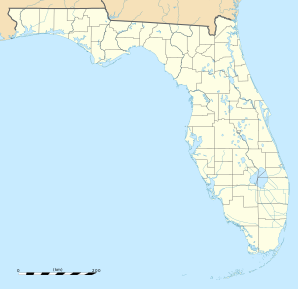Clarcona
| Clarcona | ||
|---|---|---|
|
Location in Florida
|
||
| Basic data | ||
| State : | United States | |
| State : | Florida | |
| County : | Orange County | |
| Coordinates : | 28 ° 37 ′ N , 81 ° 30 ′ W | |
| Time zone : | Eastern ( UTC − 5 / −4 ) | |
| Residents : | 2,990 (as of 2010) | |
| Population density : | 226.5 inhabitants per km 2 | |
| Area : | 14.2 km 2 (approx. 5 mi 2 ) of which 13.2 km 2 (approx. 5 mi 2 ) is land |
|
| Height : | 30 m | |
| Postal code : | 32710 | |
| Area code : | +1 407 | |
| FIPS : | 12-12675 | |
| GNIS ID : | 280488 | |
Clarcona is a census-designated place (CDP) in Orange County in the US state of Florida with 2990 inhabitants (as of 2010).
geography
Clarcona borders directly on Orlando in the southeast . The Florida Central Railroad operates freight traffic from here to Winter Garden , Forest City , Orlando and Sorrento and Umatilla .
history
In 1888 the Florida Midland Railway opened, running from Lake Jesup via Clarcona to Kissimmee . In 1896 the company was incorporated into the Plant System .
Demographic data
According to the 2010 census, the then 2990 inhabitants were distributed over 1598 households. The population density was 226.5 inh / km². 77.8% of the population identified themselves as whites, 14.6% as African American , 0.8% as Indians and 1.3% as Asian Americans . 3.4% said they belonged to another ethnic group and 2.1% to several ethnic groups. 10.7% of the population were Hispanics or Latinos .
In 2010 children under the age of 18 lived in 23.1% of all households and persons aged 65 or over lived in 34.2% of all households. 63.5% of households were family households (consisting of married couples with or without offspring or one parent with offspring). The average household size was 2.36 people and the average family size was 2.91 people.
20.0% of the population were younger than 20 years old, 19.1% were 20 to 39 years old, 33.6% were 40 to 59 years old, and 27.4% were at least 60 years old. The mean age was 48 years. 49.6% of the population were male and 50.4% were female.
The median annual income was $ 37,575, with 21.5% of the population living below the poverty line.
Individual evidence
- ^ Gregg Turner: A Short History of Florida Railroads. Arcadia Publishing , Mount Pleasant 2014, ISBN 978-1-439642-54-2
- ^ Profile of General Population and Housing Characteristics: 2010. United States Census Bureau , accessed July 19, 2015 .

